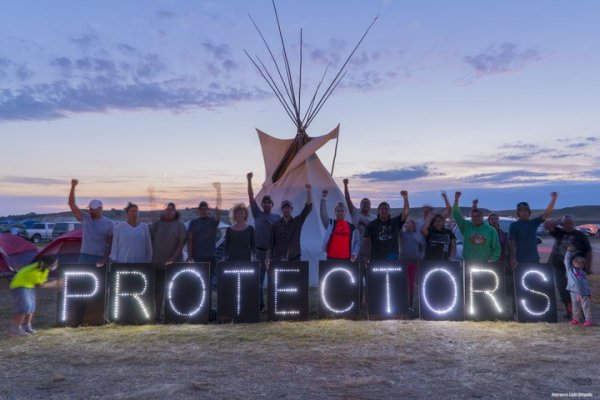
In late May, I travelled to Minnesota by train with three other local grandmothers, Janie Kesselman, Shirley Osgood, and Joyce Banzhaf, to join a 31-member delegation of 1000 Grandmothers for Future Generations. Our purpose was to highlight the intergenerational nature of the struggle to stop construction of the Enbridge Line 3 dirty tar sands oil pipeline. Together, we visited and helped out at the Water Protectors Camp which serves as a welcome center for visiting Line 3 activists, we hosted young Indigenous activists from a frontline camp for a memorial ceremony on the 1st anniversary of George Floyd’s death, and we held two public demonstrations, including one at the Minnesota Governor’s Mansion in St. Paul See video of that action here and See pictures of the trip here.
The delegation included Lakota grandmothers from South Dakota, including Madonna Thunder Hawk and Mabel Ann Eagle Hunter, who have been activists struggling for Indigenous rights and the rights of Mother Earth for over 60 years; Alcatraz was in 1968, and was not their first big action! They were engaged in an ongoing way with the American Indian Movement (AIM). Their daughters and niece, now also grandmothers, had also been involved with AIM as children and teens and were also part of this delegation. All of us were motivated by concerns for today’s children, for the natural world and our other-than-human relatives, and for future generations.
Our grandmothers’ trip was a precursor to the Treaty People Gathering that is taking place early in June in support of the Anishinaabe people, whose treaty rights are threatened by this pipeline. (See #TreatyPeopleGathering). Massive demonstrations are taking place along the route of pipeline construction. Thousands are participating, including Indigenous leaders, celebrities, climate justice activists, and others who understand what is at stake if the construction of oil and gas pipelines and other fossil fuel infrastructure continues to extend the fossil-fuel era. People are engaging in major public actions, including nonviolent civil disobedience at pipeline construction sites.
The Nevada County contingent stayed an extra day and participated in an action led by Indigenous youth where two young people were arrested for trespassing and stopping workers from continuing construction by climbing onto the newly-laid pipeline. The four of us did not risk arrest and made it to the train for our return trip that night. We returned home grateful for being welcomed and included, sobered by all that we had learned and have yet to learn about the issues related to Line 3 and about respecting Indigenous leadership.
The Enbridge Line 3 Pipeline would run from Canada through the Mississippi headwaters and Minnesota’s lake country, threatening its pristine waters. It also runs through sacred ancient wild rice beds, traditionally harvested by the Anishinaabe people. This land is under treaty with the Anishinaabe, who have the rights to hunt, fish, and gather wild rice, all threatened by this pipeline. Treaty rights are the law of the land, with priority over federal or state laws.
Enbridge, a Canadian corporation, has a terrible safety record, with over 1068 pipeline spills before 2013, leaking 7.4 million gallons of oil. Disastrous spills continue. Enbridge calls the new Line 3 a “replacement pipeline” although it is constructing 300 miles of pipeline along a new route, abandoning the old pipeline to deteriorate in place, and doubling the quantity of dirty tar sands oil.
Climate activists make the case that long-lasting fossil fuel infrastructure such as pipelines locks us into increasing greenhouse gas emissions and rising global temperatures for decades. This project alone would have the climate impact of 50 coal mines, counteracting Minnesota’s plans to reduce climate change by investing in renewable energy, green jobs, energy-efficient buildings, and electric cars.
Since 2011, the United States has been a net exporter of fossil fuels. Under the Paris Climate Accords, our exports of fossil fuel are not counted. So even if we reduce emissions nationally, by continuing to increase our exports of fossil fuels we cancel out our stated intentions to reduce global climate change. Stopping construction of new oil and gas pipelines is a necessary step to addressing climate change.
Finally, solidarity with Indigenous peoples in their struggles for a livable world is a way to affirm indigenous wisdom and perspectives that move us from a worldview that promotes organizing society around the market to a worldview that promotes organizing around concern for the whole community of life. This lays a foundation for actions that impact the future in ways that further the good and heal the past.
For anyone who is convinced that the struggle against Line 3 is an important effort, there are many actions that we can take. Indigenous leaders are requesting that supporters call on President Biden to cancel this pipeline. Find a petition here: https://www.stopline3.org/take-action. Go to https://www.stopline3.org/biden for more information on how to contact Biden and make it clear to him that there is a large and diverse intergenerational movement to #StopLine3.
To receive an email notification each time Sharon posts to her blog, click the “Follow Sharon Delgado” button at the right.
https://www.oilandwaterdontmix.org/enbridge_safety_record










